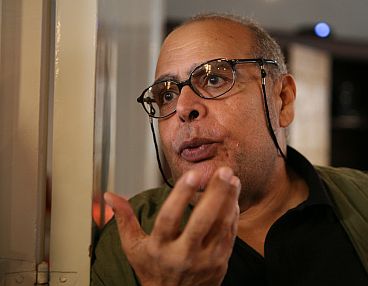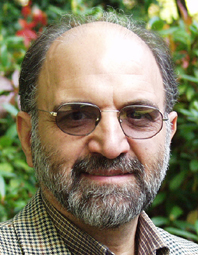
The Arab sensitivity towards Western thought's focus on the ‘history of the West’ has led to a populist conception on a ‘West-centric bias’, and the mindset has turned into an emotional reaction and a reversion towards religious and linguistic identity. We find such thought in the writings of Ṭaha ‘Abd al-Raḥmān and Abū Yaʽrub al-Marzūqī, and others, writings which are held to be the ‘contemporary philosophy of the Salafis.’ These and others like them aim to convince the world that we, the Arabs and Muslims, are ‘something separate’, a separate human race, so different that the categories of human understanding as defined by Kant or Husserl cannot apply to us.
WITH THIS UNDERSTANDING they are not content with confirming racist Orientalist clichés, but are drawing in many sympathizers among youth who are failing to reconcile their religious upbringing with the boldness of thinking that we see in the philosophies of Heidegger, Nietzsche, Deleuze, Foucault, Bataille and others (1).
For the sake of this ‘particularism’ and ‘unchangeable verities’ a solution of ‘authenticity and modernity’ is proposed, one based on the desire to ‘reconcile modernity with the heritage’. The disadvantage of this approach is that it is based on ideologies that seek the supremacy of one party at the expense of another, and in this equation modernity is often on the losing side.
Authenticity, particularism and the unchangeables
The problem of reconciling ‘originality and modernity’ or ‘tradition and modernity’ lies in its transformation into an ideology that can only solve the issue according to their equation, under which its advocates seek to make future identity dependent upon in two different eras, the past and the present (or rather the past and the ‘other’, since an identity of the present is absent).
According to this equation progress can only be made by going back, since due to their attachment to the past the Arabs and Muslims,
have become, in their self-awareness and in the others’ perception of them, the nation of the Golden Age, yet it is a backward-leaning Golden Age, not a forward-leaning one, it is a Golden Age that does not make sense of itself in the future except in the form of a revival of the past: for them, Utopia is a process of resurrection (2),
and not of creation, innovation or creativity.
Attempts at revival that take Arab ‘particularism’ and Islamic ‘unchangeables’ as a reference point for coming up with detailed solutions based on calibrating these particularities and unchangeables have become an obstacle in the search for an effective answer to the issue of a renaissance. It is as if the Arabs, under the pretext of ‘particularism’ and ‘the unchangeables’, have no wish to be cured of the disease of underdevelopment, and instead are happy for their condition to remain as it is. When Arabs and Muslims appear to describe Western civilization as a material civilization, in contrast to their own ‘spiritual’ civilization, they have decided that their situation will never change since they have failed to produce a civilisation formula that combines the spiritual and the material, on the grounds that Western civilization, according to this equation, lacks the spiritual dimension. This judgment on Western civilization as materialistic derives from a misunderstanding of the way of living, the life or the nature of Western civilization, which they hold to be lacking anything like a soul. So long as this fundamentally invalid judgment persists, we may in all justification say that such a civilisation formula cannot be possible, and indeed is a pure fantasy deriving from a mistrust of the other.
The Islamic concept of ‘particularism’ is merely an Arabic version of European totalitarian ideologies
The problem of religious discourse, as the thinker Naṣr Ḥāmid Abū Zayd saw it, is that it “plays on the strings of ‘particularism’” (as if we were a innovation among human beings: what goes for the rest of the world does not apply to us) without those who are being deceived by it engaging in any scrutiny of the concept of the ‘particularism’ put forward in religious discourse, or understanding that it is a very poor, closed ‘particularism’ – one that confines the many dimensions of a man’s identity to one alone: the ‘religious’ dimension (3).
In such a discourse,
authenticity and particularism are two characteristics of the self, referring to the ego versus the non-ego, the subjective versus the accidental, and the natural versus the artificial. Particularism is not placed in contradistinction to totalisation or generalisation, but rather to a loss of uniqueness and a dissolving into another particularism. Particularism and authenticity are what lurk within the heritage, that turns historical depth against transition, authenticity against assimilation – a historical continuity and homogeneity through time. In this way, it is made to turn eventually into absolute roots, a sign of a general conservative preparedness to submit to social forces that point backwards. This is the substance of the claim to the complete historical independence of the Arab self.(4)
Particularism has its roots in jurisprudence in that:
it is clear that our Islamic jurisprudence has been built upon a specific vision of the human being and a special view of human rights… This specific vision has an active role and important influence on the formulation of fatwās and jurisprudential theory, whether consciously or unconsciously… Jurists must revisit how they consider precedent and the legal edifice, and they must reveal the impulses that lie behind these, and strive to remove the dust from them… that is, an ijtihād on their very principles and branches. (5)
In these jurisprudential roots of the Islamic concept of ‘particularism’ we get a glimpse of the image of ‘totalitarianism’ that Dr. Abdul Karim Soroush approached when he compared on the one hand the liberal and totalitarian systems, and on the other hand the liberal system and the prevalent religious thought in our eastern societies.
The liberal government is a type of rational, scientific form of administration associated with tools to curtail power and authority via the principles of democracy. As for totalitarian governments (including, of course, religious and Islamic governments), these are based on steering people along a specific path. Hence the liberal government is a method and a tool, while the totalitarian system is a kind of ‘truth’. In liberalism, a person ponders on how to rule, while in totalitarianism he wonders who it is that is ruling and who has the right to govern. In the liberal system, the government benefits from the active participation of people and their and their intellect, while in the totalitarian system the government benefits from the emotions of the people, emotions it seeks to harness and subjugate. In liberalism, people’s minds are motivated and activated, while in totalitarianism they are curtailed and shackled. In liberalism, liberal thought depends on the statement of truth, while other systems depend on the concept of obligation (6).
Thus, the Islamic concept of ‘particularism’ becomes merely an Arabic version of European totalitarian ideologies, and this is confirmed by Stephen Ulph in his research on the parallels between the ideology of radical Islamism and the European totalitarian ideologies of the 20th century, in which he concluded that the Islamic ideology
was not in itself a unique phenomenon. It was, instead, a Middle Eastern version of fascism.
Ulph considers that the principle of ‘authenticity’ is linked to a tendency towards restoring pristine purity, which
for the Italians meant restoring their ancient Roman vigour. For Germany it demanded the re-Aryanization of European civilization and the purging of the tribal outsider. For Marxists, the coming New Man would be one that was devoid of the accumulated vices of modern capitalism, and devoted to building selflessly the new society. What links this impulse to the Islamist model is the authenticity principle of the Islamists, among whom the palingenesis idea is explicitly stated in terms of a rebirth out of the prevailing jāhiliyya as a new, renewed, mujāhid Muslim. The impulse is entirely one of ‘re-authentication’, that is, a drive towards regaining the formula that once brought Muslims their divinely ordained primacy but which now has been withdrawn from them, causing them to lose their vigor. (7)
Based on the concept of ‘particularism’ and the concept of the ‘unchangeables’, the dispute still persists between one party that believes that the reason for our backwardness is the departure from the true religion, its commands and prohibitions, and that progress can only be achieved by returning to it. Their equation is very simple: following God’s commands + avoiding His prohibitions = progress, or as Malek Bennabi put is: time + soil + human being = civilization.

Suggested Reading
A second party believes that progress cannot occur without conjoining the wheel of the past with the wheel of the present. Still another party believes that progress is made by looking at the problems of the present with the eyes of those present, and that any return to the past is only for the purpose of avoiding its mistakes or critically engaging with it for the cause of renewal, not for glorifying it. This party sees no objection to drawing inspiration from the experiences of others which had the same origin and a common aim.
1) Ḥamīd Zannār, أسفار العقل, (‘Voyages of the Mind’) Al-Rafid Book, pp. 98-99
2) George Tarabishi, المثقفون العرب والتراث (Arab Intellectuals and Heritage), p.76 (from The Concept of Secularism in Arab Political Discourse by Kamāl ‘Abd al-Laṭīf).
3) Nasr Ḥāmid Abū Zayd, الفزع من العلمانية: فصل الدين عن الدولة (‘Terrified of Secularism: Separating Religion from the State’) 20th Oct. 2010.
4) ʽAzīz al-Aẓma, العلمانية من منظور مختلف (‘Secularism from a Different Perspective’), Kitāb fī Jarīda, 9th April 2008.
5) Dr. Abdul Karim Soroush, الدين العلماني (‘The Secular Religion’), p. 103
6) Op. cit., pp. 72, 73
7) Stephen Ulph, Islamism and Totalitarianism – The Comparison Vulnerability, The Westminster Institute, VA and Isaac Publishing, May 2012.
Read Part 1 of this series here


